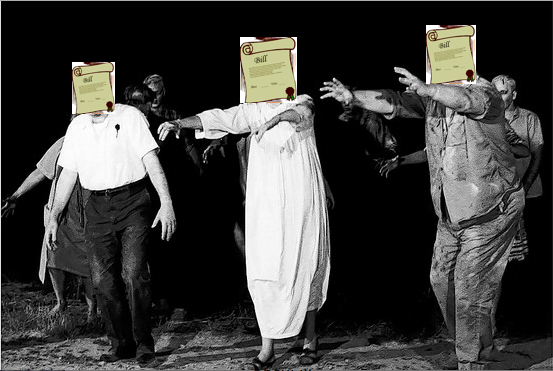It’s Night of the Living Dead Legislation over at the Capitol. For the umpteenth year in a row the same people lined up to endorse the same proposals with just a little less life left in their eyes.
On Thursday the Labor and Public Employees Committee held a public hearing once again on a $15 minimum wage and a state-run, paid Family Medical Leave program. Once again, the same proponents shuffled up to the microphone and gave their obligatory stump speech. Union leaders talked about fairness for workers — leaving out the part where a higher minimum wage would drive up union wages. Politicians played for votes seeking to rally their base.
Like the slow stumble of a George Romero-style zombie, these bills-in-need-of-brains find their way into committee hearings, moan and gnash their teeth, and eventually die off only to rise again from the dead the following year.

But no gathering of zombie bills would be complete without the customary savaging of anyone who dared speak against such proposals.
Keith Beaulieu, a small business owner from Manchester, testified that raising the minimum wage to $15 per hour would essentially force him out of business because his payroll costs would be too high. The “progressive” members of the committee each moved in and took their pound of flesh for Mr. Beaulieu’s efforts.
A real, live small business owner actually showed up to tell the state that such a proposal will ruin his business, and committee members couldn’t wait to bite down.
Of course, this is all in the name of “fairness,” something Gov. Malloy made the focus of his state of the state speech this year.
One of the arguments for increasing the minimum wage and enacting a state-run, paid FMLA system (which would be the most generous payout in the nation) is that Connecticut should play catch-up with other states enacting such programs — states that are all doing much better than Connecticut.
Proponents of increasing the minimum wage to $15 per hour and paid FMLA look at these states and say, “See? They’re doing it, too! We have to be competitive!”
Of course, that’s the only time they want to be competitive. When it comes to tax rates, those same individuals don’t want Connecticut to be competitive. Instead they want to drive costs even higher. They also don’t want to follow other states in setting retirement benefits in statute, or reforming pensions so those costs don’t cannibalize other state services.
Nope. Zombies focus on one thing and one thing only: disregarding whatever damage their singular pursuit may cause — like lower employment, higher taxes and loss of population. When it comes to the issues that affect taxpayers’ wallets, more and more the state finds itself coming in last — living dead last.
Perhaps the reason the governor, unions and certain members of the legislature are so concerned with a higher minimum wage is that the only jobs growing in Connecticut are low-paying service industry jobs.
Politicians who sing Connecticut’s praises always talk about the quality of Connecticut’s education system, the matriculation rates, and the resulting “highly educated workforce.” But despite the highly educated workforce, Connecticut appears to be churning out more bartenders and dishwashers. Where did all the high-paying jobs go for the highly educated workforce?
Given the opportunity, smart people and businesses don’t stick around for very long when zombies start showing up. They scramble for safety.
When it comes to competing for high-paying jobs — for jobs that are meant to support a family and make a career — Connecticut is losing and seemingly quite reluctant to follow in the footsteps of states that have turned their economies around by cutting spending and lowering taxes.
So broken and nearly lifeless, Connecticut stumbles along trying to follow a select group of states like a zombie tracking amorous teenagers. Movie zombies cry out for “bains,” Connecticut’s zombie legislation calls out for “fairness” and both seek to consume the unsuspecting.
Even proponents of these measures acknowledge there is little chance of them passing. Connecticut’s people are fed up and showing little patience for grand ideas acted out in the name of being fair. This is not the time in the Nutmeg State’s history to be conducting grand social and/or economic experiments.
No. Connecticut is now at that point which occurs in every zombie movie — the lone group of survivors has to board up the windows, secure the doorways and figure out how to ration the remaining food and water while holding the undead hordes at bay.
These bills will certainly pass out of the Labor Committee this year, the way they have in years past, but even if they don’t get a vote in the legislature, do not doubt they will rise from the grave again.
And that’s why those brave voices who oppose these zombie bills have to remain vigilant.
If there’s a lesson to be learned from the Romero films, its that mindless and slow moving zombies can still be dangerous because they just keep coming and have a way of lulling their victims into a false sense of security.

